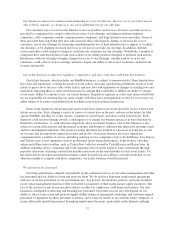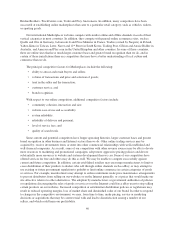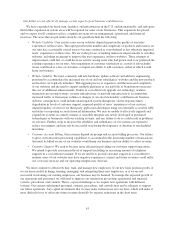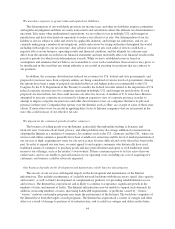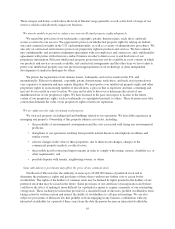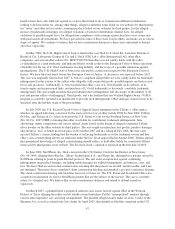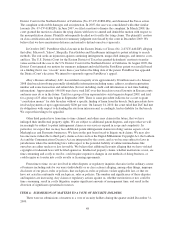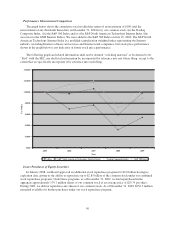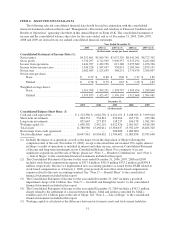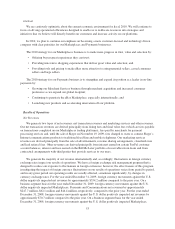eBay 2009 Annual Report Download - page 52
Download and view the complete annual report
Please find page 52 of the 2009 eBay annual report below. You can navigate through the pages in the report by either clicking on the pages listed below, or by using the keyword search tool below to find specific information within the annual report.We may have exposure to greater than anticipated tax liabilities.
The determination of our worldwide provision for income taxes and other tax liabilities requires estimation
and significant judgment and there are many transactions and calculations where the ultimate tax determination is
uncertain. Like many other multinational corporations, we are subject to tax in multiple U.S. and foreign tax
jurisdictions and have structured our operations to reduce our effective tax rate. Our determination of our tax
liability is always subject to audit and review by applicable domestic and foreign tax authorities, and we are
currently undergoing a number of investigations, audits and reviews by taxing authorities throughout the world,
including with respect to our tax structure. Any adverse outcome of any such audit or review could have a
negative effect on our business, operating results and financial condition, and the ultimate tax outcome may
differ from the amounts recorded in our financial statements and may materially affect our financial results in the
period or periods for which such determination is made. While we have established reserves based on
assumptions and estimates that we believe are reasonable to cover such eventualities, these reserves may prove to
be insufficient in the event that any taxing authority is successful in asserting tax positions that are contrary to
our positions.
In addition, the economic downturn has reduced tax revenues for U.S. federal and state governments, and
proposals to increase taxes from corporate entities are being considered at various levels of government. Among
the options have been a range of proposals included in the tax and budget policies recommended to the U.S.
Congress by the U.S. Department of the Treasury to modify the federal tax rules related to the imposition of U.S
federal corporate income taxes for companies operating in multiple U.S. and foreign tax jurisdictions. If such
proposals are enacted into law, this could increase our effective tax rate. A number of U.S. states have likewise
attempted to increase corporate tax revenues by taking an expansive view of corporate presence in order to
attempt to impose corporate income taxes and other direct business taxes on companies that have no physical
presence in their state. Companies that operate over the Internet, such as eBay, are a target of some of these state
efforts. If more states were successful in applying direct taxes to Internet companies that are not present in the
state, this could increase of our effective tax rate.
We depend on the continued growth of online commerce.
The business of selling goods over the Internet, particularly through online trading, is dynamic and
relatively new. Concerns about fraud, privacy, and other problems may discourage additional consumers from
adopting the Internet as a medium of commerce. In countries such as the U.S., Germany and the U.K., where our
services and online commerce generally have been available for some time and the level of market penetration of
our services is high, acquiring new users for our services may be more difficult and costly than it has been in the
past. In order to expand our user base, we must appeal to and acquire consumers who historically have used
traditional means of commerce to purchase goods and may prefer Internet analogues to such traditional retail
means to our offerings, such as the retailer’s own website. If these consumers prove to be less active than our
earlier users, and we are unable to gain efficiencies in our operating costs, including our cost of acquiring new
customers, our business could be adversely impacted.
Our business depends on the development and maintenance of the Internet infrastructure.
The success of our services will depend largely on the development and maintenance of the Internet
infrastructure. This includes maintenance of a reliable network backbone with the necessary speed, data capacity,
and security, as well as timely development of complementary products, for providing reliable Internet access
and services. The Internet has experienced, and is likely to continue to experience, significant growth in the
numbers of users and amount of traffic. The Internet infrastructure may be unable to support such demands. In
addition, increasing numbers of users, increasing bandwidth requirements, or problems caused by “viruses,”
“worms,” malware and similar programs may harm the performance of the Internet. The backbone computers of
the Internet have been the targets of such programs. The Internet has experienced a variety of outages and other
delays as a result of damage to portions of its infrastructure, and it could face outages and delays in the future.
44





